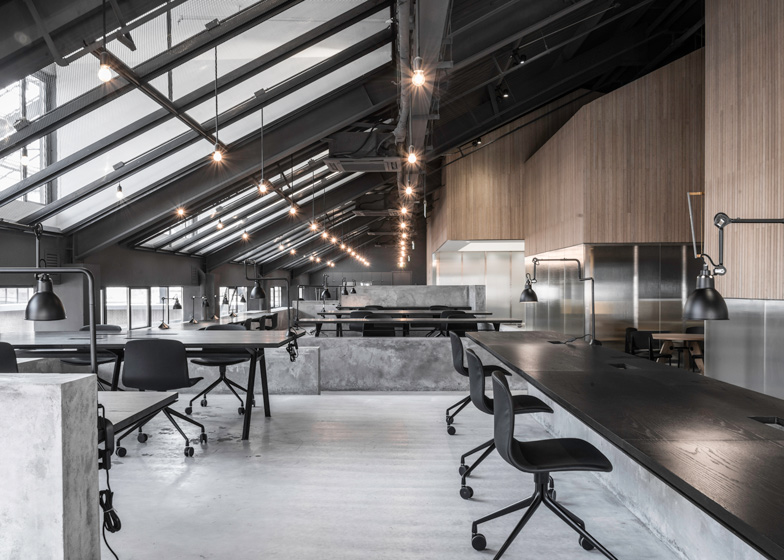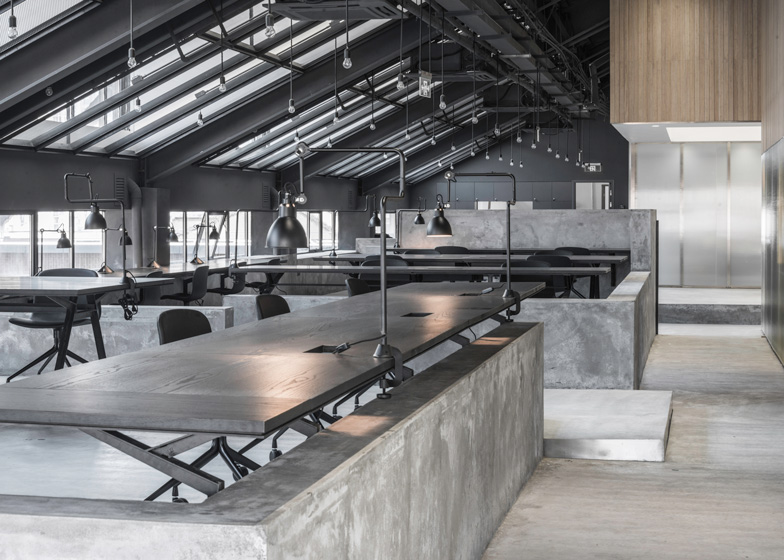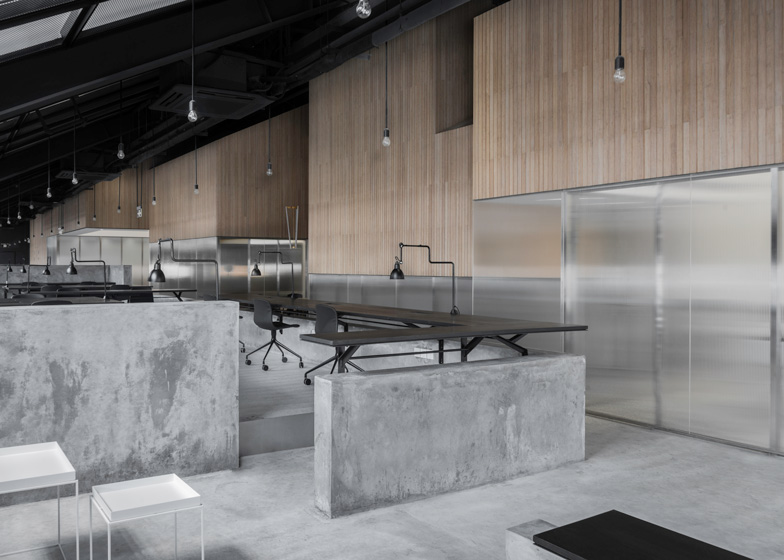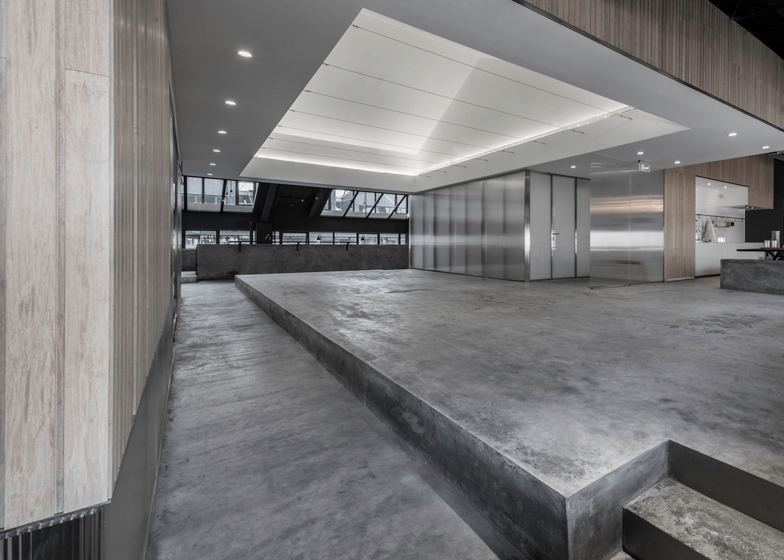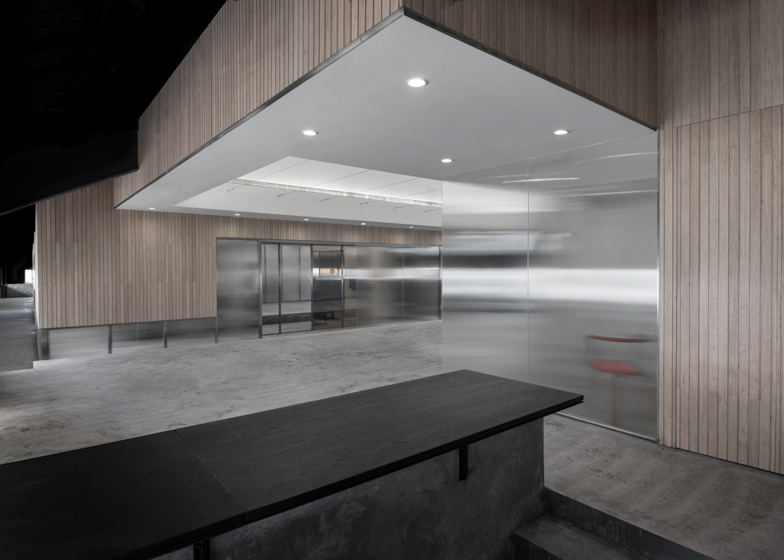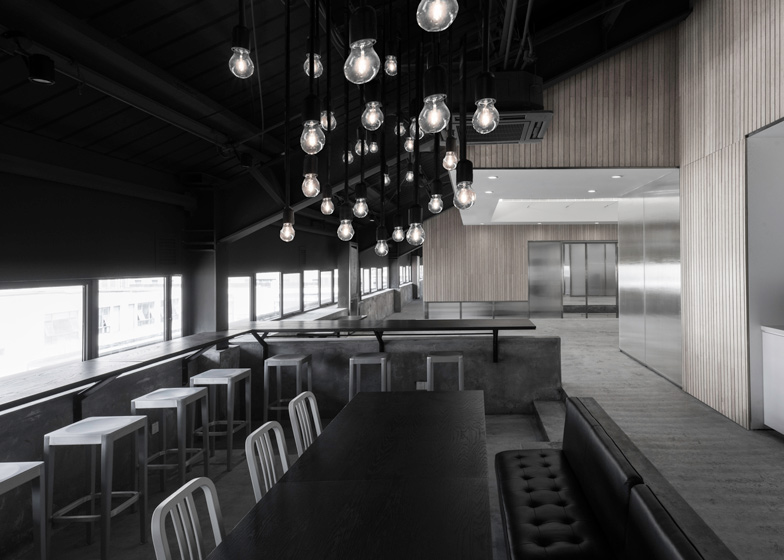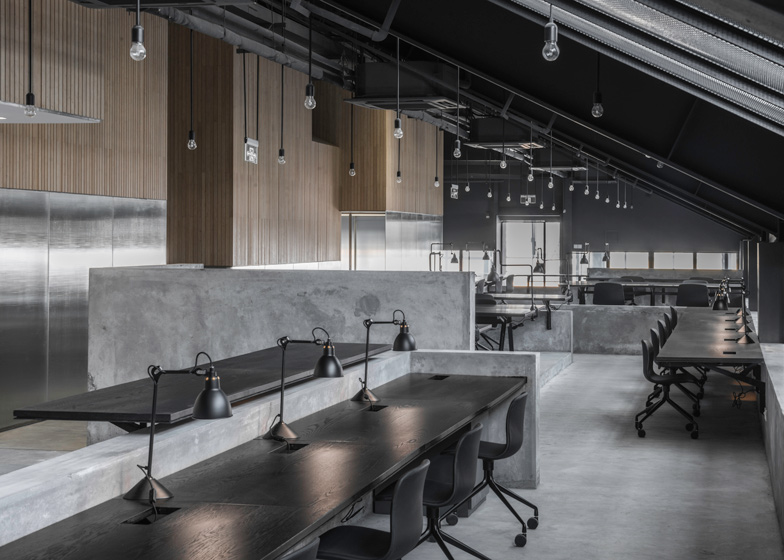Wooden house-shaped volumes are inserted into this office in the attic of a converted industrial building in Shanghai, by Chinese architects Lyndon Neri and Rossana Hu, creating a contrast with raw concrete fittings (+ slideshow).
To accentuate the location of the offices for branding consultancy firm Flamingo in the roof space of the building, Neri&Hu constructed house-shaped volumes with pitched roofs that contain meeting and research rooms.
Taking cues from the idea of the attic as "a space of quiet and rational thought", the architects focussed on creating different experiences throughout the office based on contrasts of scale, light and shadow.
The attic space was originally created by adding a steel A-frame to the flat roof of an existing building and the installation of the house-shaped units was intended to introduce a vertical dimension that draws attention to the sloping roofline.
"The insertion of house-like volumes into a landscape of concrete platforms breaks down the homogenous space," said the architects, "such that the roof is not just a singular element, but can be experienced on multiple levels, from various vantage points and on various scales."
Clerestory windows covered in black metal mesh interrupt the slanted ceiling that floods the main work areas with natural light.
Concrete partitions are staggered throughout this space to define circulation routes and to separate work stations that feature dark wooden desks.
The opposite side of the space accommodates a boardroom, work pods, breakout areas, participant rooms for research groups and observation rooms, which are housed in the pitched-roof structures.
Whitewashed bamboo cladding gives the exterior of these units a warmth and tactility that contrasts with the colder materials used elsewhere, while textured glass panels allow light to filter through to the interiors.
The angled-shape of the attic roof becomes a feature inside the white-walled boardroom, where it is punctuated by artificial lights designed to emulate skylights.
An exhibition area at one end of the open-plan workspace features a suspended ceiling intended to help define the space's parameters.
A recessed section at the centre of the floating ceiling continues the pitched roof motif and incorporates concealed lighting.
The height of the pitched ceiling allows for the introduction of a mezzanine level accessed via a narrow staircase that emphasises the idea of the loft-style space.
The mezzanine contains a small breakout space with windows that overlook the surrounding rooms and offices below.
Glass with varying degrees of opacity and mirrored materials recur throughout the interior and reference the use of one-way mirrors between the observation rooms and participation rooms where research activities take place.
Neri&Hu applied a similar industrial aesthetic to the interior of an Italian restaurant in a steel-framed building in Shanghai, and has also created a shop for shoe brand Camper inside a former warehouse that resembles a cross-section of an old brick and timber house.
Photography is by Dirk Weiblen.
Here's a project description from Neri&Hu:
Flamingo Shanghai Office
The Attic
In the daydream, the recollection of moments of confined, simple, shut-in space are experiences of heartwarming space, of a space that does not seek to become extended, but would like above all to be possessed. In the past, the attic may have seemed too small, it may have seemed cold in winter and hot in summer. Now, however, in memory recaptured through daydreams, it is hard to say through what syncretism the attic is at once small and large, warm and cool, always comforting.
In Gaston Bachelard's seminal work The Poetics of Space he poses a metaphor of the house as a dwelling for the psyche; while the subterranean cellar represents our deep subconscious, the elevated attic is a space of quiet and rational thought. In our imaginations and memories, the attic is an oft forgotten space, a space of contradictions and possibilities, both dark and light, intimate and vast, daunting and comforting. Neri&Hu’s renovation of an industrial roof space in Shanghai into offices for creative agency Flamingo are inspired by these very paradoxical and enigmatic notions of the attic.
Essentially a flat roof converted to occupiable space with the addition of a steel A-frame structure, the site itself was a main driver for the design intent, which was to exaggerate and enhance the experience of the existing condition, that is, of occupying the space within the eaves of a roof—like an attic. The insertion of house-like volumes into a landscape of concrete platforms breaks down the homogenous space, such that the roof is not just a singular element, but can be experienced on multiple levels, from various vantage points and on various scales.
Traversing the open work area, one first experiences an extensive view of the original structures, while black metal mesh panels frame bright clerestory windows above. The exhibition area features a pure floating roof to encapsulate the space while leaving it open and flexible. The board room, on the other hand, is completely enclosed, but also captures the telltale double pitched roof and features lighting fixtures that mimic natural skylights.
To culminate the attic experience, a narrow set of stairs brings you to a small mezzanine level, a hidden room nestled within the other larger ones, its windows offer stolen glimpses into other rooms—a moment to reflect in hindsight the spaces once occupied.
Owing to the nature of the client’s work, a given element of the project are pairings of rooms divided by one-way mirror. Expanding upon notions of voyeurism and scientific observation, the interspersed use of varying types of glass—clear glass, frosted glass, one-way mirror, and mirror—forces all the occupants into a state of slight discomfort, as roles of observer and observed can be reversed at any given turn.
Through carefully crafted openings and layered materials, each enclosure becomes a viewing mechanism, a filter through which we examine others as we examine ourselves.

